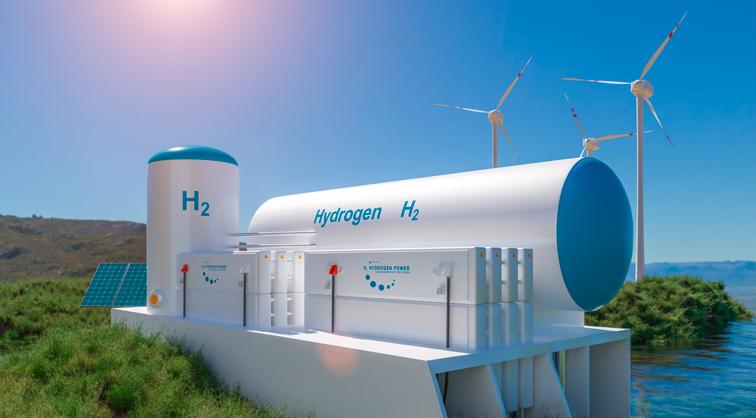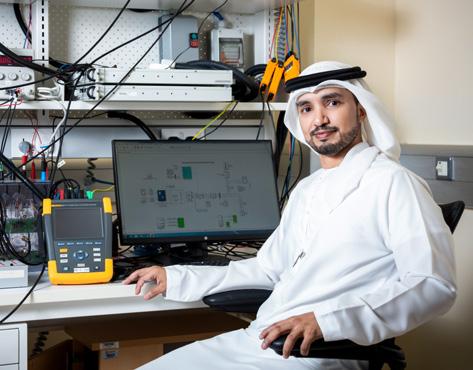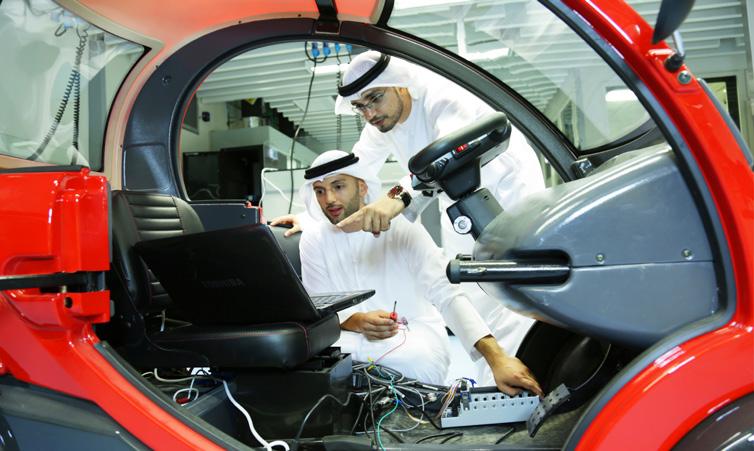
8 minute read
DR. AHMED AL-DURRA- RENEWABLE ENERGY TO PREPARE FOR THE UAE’S LAST OIL BARREL
The UAE has a unique opportunity to advance renewable energy (RE) research and become a pioneering market leader, ideally positioned for its post-oil economy.
This ambition has motivated Dr. Ahmed AlDurra, Professor of Electrical Engineering and Computer Science at Khalifa University (KU), to become an awardwinning researcher, and one of the UAE’s most prolific scholars. He has advanced research in applications of control and estimation theory on power systems stability, micro/smart grids, renewable energy (RE) systems and integration, and process control.
Advertisement
Dr. Al-Durra grew up in a tiny city near Al Ain. His parents taught him and his nine siblings to work hard and aim high to serve the nation, which led Al-Durra to become a dedicated student.
“When I was in 7th grade, I realized I needed to be challenged at school, so I asked my parents to send me to Al Ain to attend a better school. I had to catch a ride with my neighbor in the morning, and in the afternoon I would take a taxi to the highway, and then walk the remaining two kilometers home. I did this from grade 8 to 12. You may think this was too hard for a young boy, but I don’t regret it. That experience shaped me and helped make me who I am,” he said.
By the time Dr. Al-Durra graduated from high school, he was among the country’s top students and was selected by the UAE Presidential Office for its Distinguished Student Scholarship to study abroad. With a goal of studying electrical engineering, Dr. Al-Durra enrolled in Ohio State University (OSU), which had the United States’ 17th top ranked electrical engineering program.
“One freezing Ohio morning, I opened my door to find a courier holding a laptop, sent as a gift from His Highness Sheikh Mohamed Bin Zayed Al Nahyan [Crown Prince of Abu Dhabi and Deputy Supreme Commander of the UAE Armed Forces] in recognition of my academic performance. I was honored by the gift, which I’ve kept operational since then, and promised to myself to achieve the highest targets to place my country among the top scientific nations,” he recalled.
After receiving his BSc Summa Cum Laude, Dr. Al-Durra stayed at OSU for the remainder of his studies, pursuing postgraduate studies in electrical engineering through a scholarship from the Abu Dhabi National Oil Company (ADNOC).
Throughout his studies, Dr. Al-Durra focused his work on control systems and their applications, which are systems that manage, command, direct or regulate the behavior of other devices using control loops.

I also believe that we should avoid wasting fossil fuels for electricity production and automobiles, as both have RE alternatives. We should instead utilize fossil fuels in a more valuable way, for critical applications like petrochemicals and aviation, where we don’t yet have suitable alternatives.
“The beauty of my field — control systems — is that it provides the researcher with the knowledge and advance tools to deal with any system regardless of its discipline. A control system researcher only needs to understand the fundamentals and limitations of the new system in order to blend with the experts of the new discipline and start innovating new control and/or estimation techniques,” he said.
It was through this specialization that Dr. Al-Durra became involved with RE technologies. During his master’s degree studies, Dr. Al-Durra began working on hydrogen fuel cells, recognizing the importance of electrical engineering to the development of RE technologies and their integration. Hydrogen is a type of gas that is viewed as a promising, albeit underexploited, source of renewable energy. In a hydrogen fuel cell, the fuel source is hydrogen gas, which reacts with oxygen across an electrochemical cell to produce electricity, water, and some heat.
“Back then hydrogen fuel cells were a new hot topic, with a hope that hydrogen could be harvested to provide renewable and zero emissions energy for vehicles and other applications. One project at the OSU Center for Automotive Research was trying to achieve good control algorithms to deal with fuel cell systems, and they needed an electrical engineer with a background in control system theory, so I joined and became a supervisor,” Dr. Al-Durra said.
Explaining why he viewed RE to be so important, Dr. Al-Durra explained, “RE is the new direction for energy, which is partly why the UAE has focused on becoming a producer of RE technologies

for the domestic and global market. I also believe that we should avoid wasting fossil fuels for electricity production and automobiles, as both have RE alternatives. We should instead utilize fossil fuels in a more valuable way, for critical applications like petrochemicals and aviation, where we don’t yet have suitable alternatives. We also need RE to delay oil depletion. If we avoid wasting fossil fuel resources for automobiles and electrification, we can buy the necessary time to develop alternatives for aviation and petrochemicals.”
Over the period of Dr. Al-Durra’s postgraduate studies, RE became even more significant for the UAE. In 2009, the Abu Dhabi Government announced a commitment to achieving 7% of the emirate’s total power generation capacity from RE sources. Today the entire country is working towards the UAE Energy Strategy 2050 target of 50% clean energy in the total energy mix.
In 2010, Dr. Al-Durra returned to the UAE to become an assistant professor at the Petroleum Institute (PI), which at the time was a standalone engineering university linked to the Abu Dhabi National Oil Company (ADNOC) and today is a KU research institute.
“When I started at PI, I set a new goal for myself, which was to be the first Emirati professor of electrical engineering in the UAE. I took that target and worked hard to achieve it,” Dr. Al-Durra shared.
Over the course of the next ten years, Dr. Al-Durra pursued that goal with a singleminded purpose. Along the way he has earned many commendations and titles, notable among them was the Sheikh Rashid Award for Academic Excellence, the UAE Pioneers Award, membership to Mohammed Bin Rashid Academy of Scientists, and the
Khalifa Award for Education - Distinguished University Professor in Scientific Research. Dr. Al-Durra also became an editor for the Institute of Electrical and Electronics Engineers (IEEE) Transactions on Sustainable Energy and “Power Engineering Letters,” and an associate editor for IEEE Transactions on Industry Applications, the Institution of Engineering and Technology (IET) Renewable Power Generation, and Frontiers in Energy Research.
In 2017, Dr. Al-Durra published one of his more widely cited papers titled “Online energy management strategy of fuel cell hybrid electric vehicles based on data fusion approach” in the Journal of Power Sources, which has had 112 citations according to SciVal.

The paper deals with the energy management strategy of a fuel cell hybrid electric vehicle (FCHEV), which relates to the efficiency and performance of the vehicle’s energy storage. It proposed an energy management strategy for three styles of driving – highway, suburban, and city – based on a combination of the parameters from optimized fuzzy logic controllers.
“We validated the proposed method utilizing our FCHEV-hardware-in-the-loop experimental setup in the Energy Systems Control & Optimization (ESCO) Research Lab that I established, and demonstrated that the proposed method can provide the fuel cell power system a relatively stable operation power range to preserve its lifetime, achieve higher efficiency of the fuel cell system, and thus saving hydrogen consumption,” Dr. Al-Durra said.
- Dr. Ahmed Al-Durra.,Professor of Electrical Engineering and Computer Science Khalifa University
The year 2020 was one of great achievements for Dr. Al-Durra. He was promoted to full professor, included in Stanford University’s list of the world’s top 2% scientists, and won the KU College of Engineering Faculty Research Excellence Award.
More recently Dr. Al-Durra was ranked number 1 by SciVal in the UAE’s top 500 authors by scholarly output over the period of 2011 to 2020, an achievement he attributes to his focus on securing the critical elements and enabling structures necessary for quality research.
“I have been focused on developing strong research teams and establishing state-of-the-art research facilities that can raise the status of the university and country while facilitating research that can be published in top-tier journals. That is why I established the ESCO lab and am leading the Industry Engagement Theme for Advanced Power & Energy Center. This work has enabled me to contribute to the publication of over 250 articles in high quality publications,” he shared.
Having achieved so much in such a relatively short period of time, Dr. Al-Durra has set himself another ambitious target. “I spent 10 years to achieve my goal of becoming the first Emirati professor of electrical engineering. Now, my next milestone is to become the first UAE National IEEE Fellow. This is a prestigious level of membership of the IEEE and is given to only one out of 1000 members. So far, no Emirati has yet achieved this rank, so that is my next goal,” he revealed.
He is also continuing his work to support the UAE’s RE integration goals, with research focused on micro/smart grids, integration of renewable energy systems and storage devices, and transportation electrification.
“To paraphrase His Highness Sheikh Mohamed Bin Zayed Al Nahyan ‘if we do the right investment today, we will celebrate the moment we load our last barrel of oil.’ To prepare for that moment, one of the challenges is to come up with solutions for RE integration to the current grid and how to plan and use energy storage schemes optimally. We can capture solar energy in the day, but we also must store some for use at night and during poor weather conditions,” Dr. Al-Durra said.









